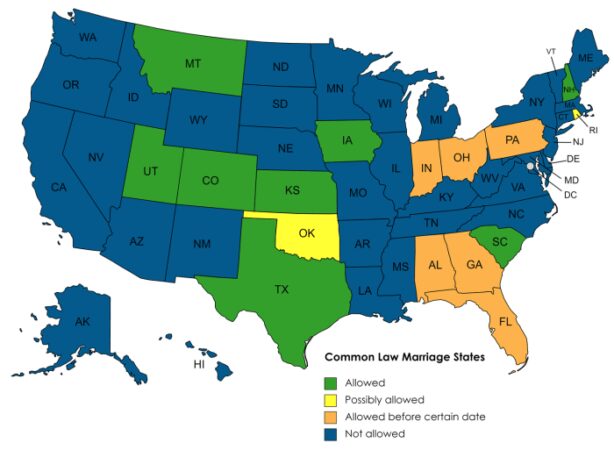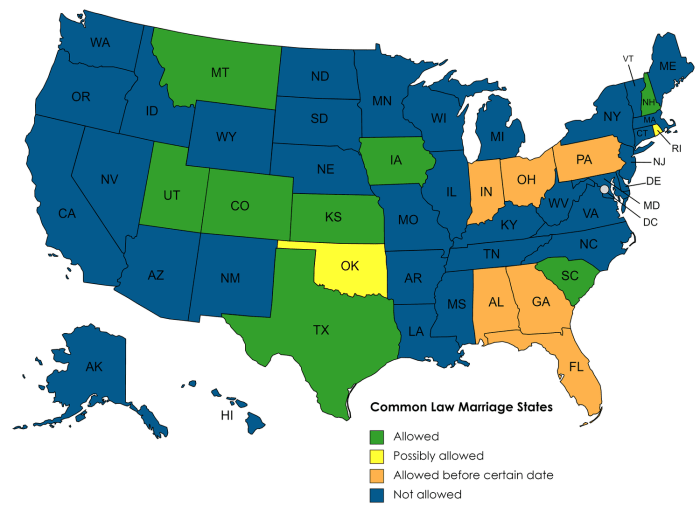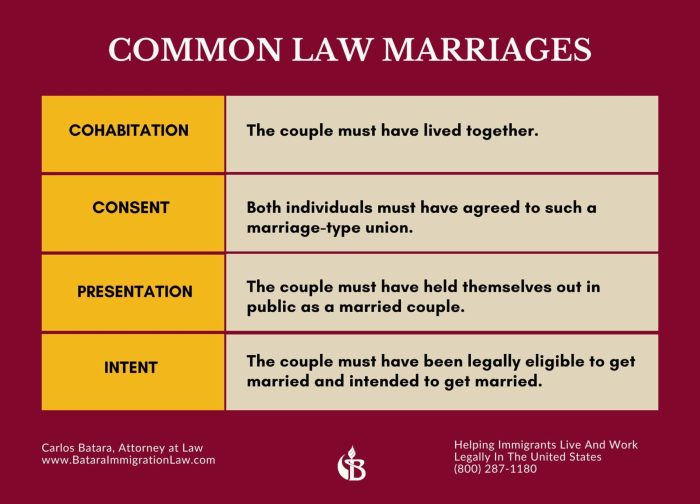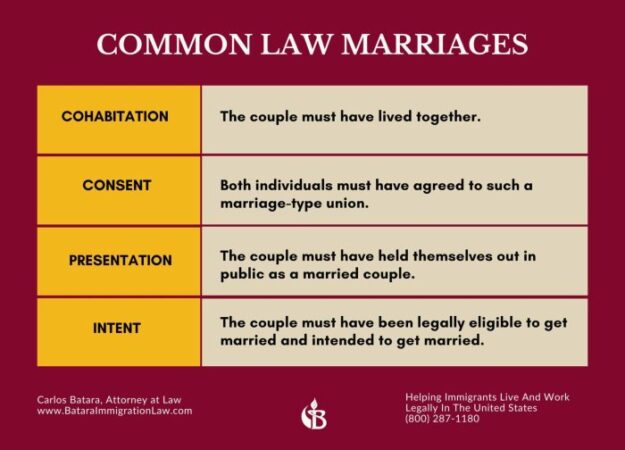
Is there common law marriage in California? The answer, surprisingly, is no. While common law marriage is recognized in some states, California has a long-standing tradition of requiring couples to formalize their relationships through a legal marriage ceremony. This means that simply living together and presenting yourselves as a married couple won’t create a legally binding marriage in California.
The history behind this legal stance is rooted in a desire for clarity and to prevent potential disputes over property, inheritance, and other legal issues that can arise in unmarried relationships. While this may seem restrictive to some, it ultimately aims to protect both individuals and families from potential legal complications.
Introduction to Common Law Marriage

Common law marriage, also known as informal marriage or “marriage by habit and repute,” is a legal concept where a couple is recognized as married without a formal ceremony or license. While it’s not recognized in all states, it was historically common in many parts of the world, with roots dating back to ancient times.
Historically, common law marriage was often used in situations where couples were unable to afford a formal wedding or where religious or social customs did not allow for formal marriage. However, as societal norms evolved and the need for legal documentation increased, the recognition of common law marriage has declined in many jurisdictions.
Holding Oneself Out as Married, Is there common law marriage in california
The key element in establishing a common law marriage is the intent to be married, demonstrated by the couple “holding themselves out as married” to the public. This means they present themselves as a married couple to the world, regardless of whether they have a formal marriage license.
The concept of “holding oneself out as married” involves a combination of actions and public representations that demonstrate a couple’s intent to be recognized as a married unit. This can include, but is not limited to:
- Using the same last name
- Referring to each other as “husband” and “wife” in public
- Sharing a residence and presenting themselves as a married couple to family, friends, and the community
- Filing joint tax returns
- Opening joint bank accounts
- Holding themselves out as a married couple in legal documents, such as medical records or property deeds
California’s Stance on Common Law Marriage
California does not recognize common law marriage. This means that two people cannot become legally married simply by living together, presenting themselves as a married couple, or intending to be married.
Reasons for Non-Recognition
California’s decision not to recognize common law marriage stems from a combination of historical and legal considerations.
- Preventing Fraud and Abuse: The lack of formal requirements in common law marriage could create opportunities for fraud, where individuals might falsely claim to be married for financial or other benefits.
- Ensuring Clarity and Certainty: Formal marriage provides a clear and legally defined framework for rights and obligations. Common law marriage, with its less defined requirements, could lead to ambiguity and disputes about the status of a relationship.
- Historical Context: California has a long history of rejecting common law marriage. The state’s Civil Code, enacted in 1872, explicitly excluded common law marriage.
The Impact of California’s Law
California’s refusal to recognize common law marriage has significant implications for individuals in relationships, especially those who believe they are in a common law marriage. While many states recognize this legal status, California’s stance can lead to unforeseen legal challenges and complications.
Legal Challenges Faced by Couples
Couples who believe they are in a common law marriage in California may face several legal challenges due to the state’s non-recognition of this legal status. These challenges can arise in various areas of law, such as property division, child custody, and inheritance rights.
Property Division
- In California, property division is governed by community property laws, which state that all assets acquired during a marriage are jointly owned by both spouses. However, if a couple is not legally married, their property is considered separate property, and each individual retains ownership of their assets.
- For example, if a couple has been living together for ten years and has accumulated significant assets, such as a house, savings accounts, or investments, they may believe they are entitled to an equal share of these assets. However, if they are not legally married, a court will not recognize their relationship as a marriage, and the property will be divided according to separate property laws.
Child Custody
- While California courts consider the best interests of the child when determining custody arrangements, the legal status of the parents can influence the outcome of custody disputes.
- If a couple is not legally married, the court may consider the non-biological parent as a “de facto” parent, meaning they have acted as a parent to the child and have a significant relationship with the child. However, this status does not automatically grant the non-biological parent equal custody rights as a legal parent.
- In cases where a couple is not legally married, the non-biological parent may need to establish legal parental rights through a court order, which can be a lengthy and expensive process.
Inheritance Rights
- In California, inheritance rights are governed by the state’s intestacy laws, which dictate how property is distributed when someone dies without a will. If a couple is not legally married, the surviving partner is not entitled to inherit any of the deceased partner’s property.
- For example, if a couple has been living together for many years and one partner dies without a will, the surviving partner will not be recognized as a spouse under California law, and the deceased partner’s property will be distributed according to intestacy laws, which may include distribution to other family members.
Alternatives to Common Law Marriage in California: Is There Common Law Marriage In California

While California does not recognize common law marriage, there are several legal options available to couples who wish to formalize their relationship. These alternatives provide the legal protections and benefits that come with marriage, offering couples a way to secure their rights and responsibilities within the legal framework.
Obtaining a Marriage License and Getting Legally Married
In California, couples seeking to formalize their relationship through traditional marriage must obtain a marriage license from the county clerk’s office. This process typically involves providing personal information, proof of identification, and payment of a fee. Once the license is issued, the couple must then find an authorized officiant, such as a judge, priest, or rabbi, to perform the marriage ceremony. The ceremony must be witnessed by at least one adult. Once the ceremony is complete, the officiant will file the marriage license with the county clerk, making the marriage officially recognized by the state.
Domestic Partnerships
Domestic partnerships in California offer legal recognition to same-sex and opposite-sex couples who choose not to marry. This option provides many of the same rights and responsibilities as marriage, including inheritance rights, hospital visitation rights, and the ability to file joint tax returns. To register as a domestic partner, couples must meet specific requirements, including being at least 18 years old, having the legal capacity to marry, and not being married or in another domestic partnership. They must also file a Domestic Partnership Declaration with the California Secretary of State.
Domestic partnerships offer a valuable alternative to marriage for couples who desire legal recognition and protection without the traditional ceremony.
Legal Considerations for Couples in California

Navigating the complexities of relationships can be challenging, especially when legal implications are involved. While California does not recognize common law marriage, there are still legal considerations for couples living together, whether they intend to marry formally or not. Understanding these legal implications is crucial for protecting your rights and ensuring a smooth and fair resolution of any potential disputes.
Seeking legal advice from a qualified attorney is essential when navigating relationship issues in California. A knowledgeable attorney can help you understand California’s legal requirements, ensure your rights are protected, and establish clear legal arrangements for your relationship. This proactive approach can help prevent misunderstandings, disputes, and potential legal complications in the future.
Legal Considerations for Unmarried Couples
Understanding the legal implications of living together as an unmarried couple in California is essential. While common law marriage is not recognized, California law still addresses certain aspects of unmarried relationships, such as property ownership, financial responsibilities, and legal rights during a separation or break-up.
- Property Ownership: Cohabiting couples in California may acquire property jointly, even without a formal marriage. This could include real estate, vehicles, bank accounts, or other assets. Determining ownership rights, including the division of assets in case of separation, is crucial. It’s essential to clearly define ownership rights through written agreements or other legal documentation to avoid potential disputes later.
- Financial Responsibilities: California law doesn’t generally impose financial obligations on unmarried partners. However, there are exceptions, such as when couples co-sign loans or mortgages, or when one partner financially supports the other. It’s important to clarify financial responsibilities and establish clear agreements regarding financial contributions, debts, and shared expenses.
- Legal Rights During Separation: While California law doesn’t recognize common law marriage, it does address certain legal rights for unmarried couples during a separation. For instance, if a couple has children together, the law Artikels parental rights and responsibilities, including child custody, visitation, and child support. A qualified attorney can advise on your specific situation and help you understand your legal rights and options during a separation.
The Importance of Legal Agreements
For couples living together in California, regardless of their intention to marry, it’s crucial to establish clear legal arrangements to protect their rights and avoid potential disputes.
- Cohabitation Agreement: A cohabitation agreement is a legally binding contract that Artikels the terms of a couple’s relationship, including property ownership, financial responsibilities, and responsibilities in case of separation. It’s highly recommended for couples living together to consider a cohabitation agreement to define their rights and responsibilities clearly.
- Prenuptial Agreement: While not specific to unmarried couples, a prenuptial agreement can also be used to establish legal arrangements before a formal marriage. This agreement Artikels the division of assets and debts in the event of divorce. It can be particularly beneficial for couples with significant assets or complex financial situations.
- Domestic Partnership: California recognizes domestic partnerships for same-sex couples and some opposite-sex couples who meet specific requirements. This legal status provides many of the same rights and protections as marriage, including inheritance rights, hospital visitation, and legal decision-making.
Conclusion
Understanding California’s legal position on common law marriage is crucial for couples navigating their relationship journey. If you’re considering a long-term commitment, it’s essential to explore the legal options available to you. Seeking professional legal advice from a qualified attorney can help you make informed decisions and establish clear legal arrangements that safeguard your rights and protect your future. Remember, while California doesn’t recognize common law marriage, there are alternative ways to formalize your relationship and secure the legal protections you need.
Helpful Answers
What are the benefits of getting legally married in California?
Legal marriage in California provides numerous benefits, including inheritance rights, spousal support, and tax advantages. It also establishes clear legal recognition of your relationship and protects your rights in case of separation or divorce.
Can I register as a domestic partner in California if I’m not eligible for common law marriage?
Yes, California offers domestic partnerships as an alternative to marriage for same-sex couples and certain opposite-sex couples. It provides many of the same legal protections as marriage, including inheritance rights and hospital visitation.
What if I’ve been living with my partner for years and we believe we’re common law married?
California does not recognize common law marriage, so even if you’ve lived together for a long time and held yourselves out as married, your relationship won’t be legally recognized as a marriage. It’s crucial to seek legal advice to understand your rights and options.





